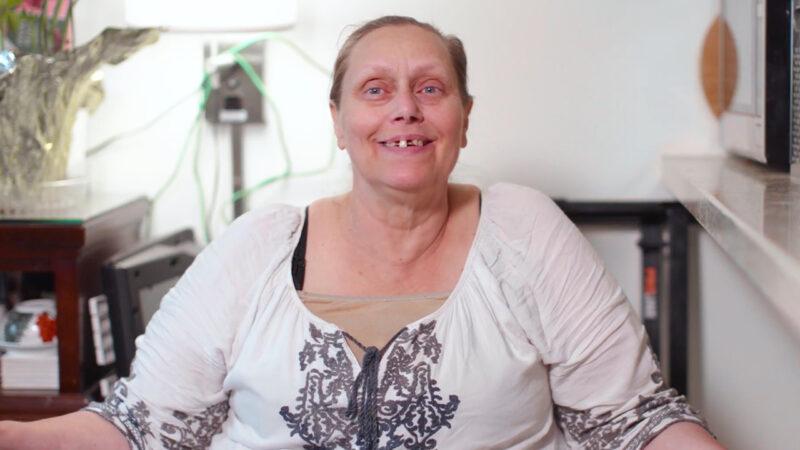Inside an Innovative Response to California’s Homelessness Crisis
Thousands of Californians experiencing homelessness now have homes through an initiative bringing together cities, affordable housing developers, and supporters like Wells Fargo.

In a new apartment in the heart of Hollywood, Karrie and her cats Gentleman and Rosebud have made a home.
In 2021, she was one of the first residents to move into a redevelopment project just steps away from the Dolby Theatre, home of the Oscars. Not long before then, a divorce and family strife left Karrie alone at a train station in the middle of the pandemic. The instability quickly left her without a home, an experience that reminded her of struggling through the foster system growing up.
“I know exactly what a homeless person feels like, always going from place to place, getting moved out and put somewhere else,” she said. “I didn’t want to be on the streets. I would go out every day to look for avenues to get help. … You can’t even dream on the streets.”
Karrie lived on the streets of Los Angeles for a week before outreach workers connected her with temporary housing. After a couple of months, she moved into the Orchid, a former Hollywood-themed hotel that was converted into permanent supportive housing via Project Homekey.
The multibillion-dollar program allowed the state of California and its housing partners to buy and renovate hotels, motels, and other sites to combat the state’s homelessness crisis.
Suddenly, Karrie had her own fully furnished apartment. The rehabilitated double-suite room came complete with glassware in the kitchen and sheets for her new bed. Not only were there services like daily meals and art therapy in her building, but holiday spreads on Thanksgiving and presents on Christmas, too.
“I felt like I was in a five-star hotel. From a cot to a king-sized bed. It was beautiful. How could you not want [that]?” she said. “I was in awe. Now I’m thinking, ‘Keep it clean and keep it beautiful.'"
What is Project Homekey and why does it work?
Behind Karrie’s journey to housing were a series of partners brought together by a hugely innovative mobilization to house people in California.
Project Homekey cut through the red tape typical of affordable housing development by offering billions in federal funds to Los Angeles County, cities, and housing organizations across the state to redevelop existing sites, rather than build new projects. Affordable housing projects typically require five or more years of finding and buying a site and amassing money from a laundry list of sources.
Geoffrey Moen, development director of the Housing Authority of the City of Los Angeles, or HACLA, one of the largest developers of Project Homekey housing, called it “unheard of.”
“It’s so different from how housing gets financed in every other way it’s done around the country,” he said. “[Homekey] is just very simple. And as a result, it allowed things to move very quickly and cut down costs tremendously.”
The unprecedented efforts were designed to address an unprecedented crisis. More than 171,000 people experience homelessness in California, which make up 30% of the country’s homelessness population and half of its unsheltered people, according to University of California San Francisco research published in June. Across the states, there’s affordable housing for only about 1 in 4 extremely low-income households.
The surge in funding and the homelessness crisis amid the pandemic meant housing partners were crunched to find and build Homekey communities. That’s where Wells Fargo Foundation experts saw an opportunity to help.
“We wanted to be in a place where we were helping the program and, therefore, helping the state to demonstrate that there are effective pathways for helping end someone’s experience of homelessness,” said Justine Gonzalez, vice president, Philanthropy & Community Impact for Wells Fargo in Los Angeles.
Through seven Project Homekey Accelerator Grants, Wells Fargo supported housing groups by funding their vetting of new housing sites and their deposits to acquire them. Several grants went to HACLA and PATH, an LA-based housing nonprofit. Such grants are part of Wells Fargo’s broader commitment as The Bank of Doing to making housing more attainable for individuals and families in California and throughout the nation.
Among the projects supported by the grants is the Orchid, which the two organizations partnered to create. Along with Wells Fargo’s initial support, the project was possible because of Homekey capital grants. Ongoing expenses are covered through housing vouchers and a portion of residents’ benefits and/or wages.
“Project Homekey allowed us to be nimble, to think of creative solutions, and to find new ways to end homelessness,” said Jennifer Hark Dietz, PATH CEO. “The fact that we have existing buildings that could be retrofitted to bring more housing online faster than ever — that’s hugely innovative for us.”
A new foundation
The first two rounds of Homekey funded the creation of nearly 13,000 homes, giving thousands of people experiencing homelessness an opportunity to get back on their feet. Gonzalez noted that supporting initiatives such as Homekey helps make individuals, families, and the communities they live in more sustainable.
“A home is very much the foundation for a household, a family, an individual’s ability to thrive. Thriving can mean economic mobility, access to education, access to transportation resources,” Gonzalez said. “That home is really the base for helping to make those other types of wealth building and economic advancement opportunities available.”
A permanent home gave Karrie the space to process what happened to her and move forward.
“The love, the kindness, touched me. People don’t realize how blessed they really are,” she said. “You can always change your [mindset] by focusing on positive things to get out of the mentality ditch you’re in.”
When she’s not taking care of her cats and doing art therapy, Karrie volunteers with her church to connect others who are experiencing homelessness with resources and community.
“There is hope out there for everybody,” she said. “I hope I can help others.”

